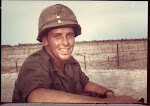BAGHDAD: It’s the fifth day of Operation Commando
Razor and thus far no word on the three captured GI s from the 2nd
Combat Brigade, Tenth Mountain Div. who are stationed here at Camp Striker,
Iraq. Phone service from Camp Striker
on the outskirts of Baghdad is still blacked out and will be, according to Maj.
Web Wright, PAO of the Brigade, until positive ID s from DNA testing are made
on the four GI s who were killed on the raid last Saturday morning near
Mahmudiyah. Until then there can be no
positive ID s on the three soldiers who are presumed to still be captives of a
fringe Al Qaida group that is known to be operating in the area SW of Baghdad
known as the ‘Triangle of Death’.
This Sunni dominated area
between Baghdad and the Euphrates is within the AO (Area of Operations) that
totals more than 300 sq. miles that is secured by the 2nd Combat
Brigade under the command of Col. Mike Kershaw.
Col Kershaw is known to be on the ground in the Mahmudiyah area, near
the town of Yusafyah, leading his troops on a house to house search of that
area. This reporter, after being bumped
from a flight to that town by a team from the NY Times late yesterday
afternoon, hopes to be with Col Kershaw later on today, weather permitting.
All highways SW of Baghdad
have come under heavy scrutiny in the search for the missing GI s. Lt. Jim Taft, Commanding officer of B troop,
189th Cavalry, 10th Mt. Div. and his convoy of four
Humvees narrowly missed being blown by an IED along Tampa highway (the main N -
S route through Iraq) 12 miles south of Baghdad around 4:00 PM yesterday
afternoon while patrolling that stretch of highway which is their
responsibility.
The lead Humvee abruptly
stopped on the return trip north. Lt.
Taft’s pulled up alongside to speak with the driver who had been warned via
radio of a possible IED near the overpass a hundred yards ahead. He was accompanied by his driver, interpreter
(who was a female from Baghdad named Anne), the turret gunner and this
reporter. Before verbal contact was made
there was a huge explosion at the suspicious location on the shoulder of the
highway.
“F--- me” yelled Lt.
Taft. “If we hadn’t stopped when we did
they’d have nailed us.” Quickly
surveying the occupants of the lead Humvees to be sure there were no casualties
from flying shrapnel, Lt. Taft ordered the men out to survey the area and stop
all traffic that was still moving on the highway. A cloud of black smoke drifted off to the
right as the men surveyed the area. “See
if you can find a wire leading from the blast and we’ll follow it.” said Lt.
Taft to one of his men.
A wire was quickly located
leading down below the underpass, along the bottom of a draw and toward a
farmhouse; perhaps a quarter mile east of Tampa Highway. Lt. Taft quickly organized a small patrol to
explore that area. Beyond the house in
the distance a white car was slowly backing away and then disappeared down a
narrow back road. The troops followed
the wire along the draw, which deepened before gradually leveling off on the
terrain leading to the seemingly abandoned farm house. Lt. Taft took the lead and entered the barn
yard compound. He fired a couple of
warning shots to let it be known that armed men were nearby..
A thorough search of the area
turned up an empty wire spool, an old light switch along with a half empty
water bottle. Further east of the abandoned house was a deep canal with very
high reeds along each bank which made a thorough search nearly impossible with
the number of men that Lt. Taft had under his command.
“It looks like he may have
panicked when he saw us stop, then he blew it off and ran. That’s common procedure for insurgents. They don’t want to leave any material behind
that can be traced, “said Lt. Taft, who then ordered two teams of two men each
to reconnoiter this side of the canal.
After finding nothing but a trail through bent reeds the men returned to
the farm house and rolled up the trip wire.
Lt. Taft radioed his men who
had remained on the highway to thoroughly search the area of the explosion and
if it looked safe to let the traffic start flowing. Tampa highway was returning to normalcy after
one more close call. Actually this kind
of day is normalcy for the people of Iraq, and the American military men who
travel up and down this highway on a regular basis.
“Well, it turned out to not
be as boring as it looked for a while,” said Lt. Jim Taft to this embedded
reporter “Perhaps you made out better
than those NY Times dudes who got you bounced from the flight to Yusafyah.” Perhaps he was right.
*A version of this article appeared in the Watertown Daily Times on May 18, 2007.




No comments:
Post a Comment